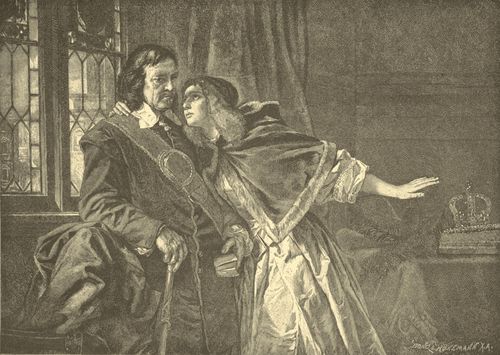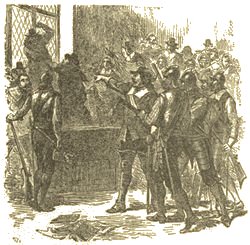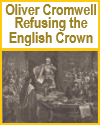Oliver Cromwell, born on April 25, 1599, in Huntingdon, England, was a significant figure in English history, best known for his role in the English Civil War and the establishment of the Commonwealth of England. Cromwell's early life was relatively modest, as he came from a gentry family and pursued a career in farming and local politics. His life took a dramatic turn with the outbreak of the Civil War in 1642.
 Cromwell emerged as a key military leader for the Parliamentarian forces, or Roundheads, against the Royalists, who supported King Charles I. His leadership and military acumen were instrumental in several key victories, including the Battle of Marston Moor in 1644 and the decisive Battle of Naseby in 1645. Cromwell's New Model Army, characterized by its discipline and effectiveness, played a crucial role in defeating the Royalist forces.
Cromwell emerged as a key military leader for the Parliamentarian forces, or Roundheads, against the Royalists, who supported King Charles I. His leadership and military acumen were instrumental in several key victories, including the Battle of Marston Moor in 1644 and the decisive Battle of Naseby in 1645. Cromwell's New Model Army, characterized by its discipline and effectiveness, played a crucial role in defeating the Royalist forces.
Following the execution of Charles I in 1649, England was declared a republic, known as the Commonwealth. Cromwell became a leading figure in the new government, eventually assuming the title of Lord Protector in 1653. His rule was marked by efforts to stabilize the nation and promote Puritan moral reforms. Cromwell's administration implemented various policies aimed at improving the economy, reforming the legal system, and promoting religious tolerance, albeit within a Protestant framework.
 However, Cromwell's tenure was not without controversy. His strict rule and the use of military force to maintain order led to criticism and resistance. His harsh campaigns in Ireland, particularly the siege of Drogheda, left a legacy of resentment.
However, Cromwell's tenure was not without controversy. His strict rule and the use of military force to maintain order led to criticism and resistance. His harsh campaigns in Ireland, particularly the siege of Drogheda, left a legacy of resentment.
In 1657, Cromwell was offered the crown by Parliament but refused, opting to maintain the republican principles he had fought for. He continued to govern as Lord Protector until his death on September 3, 1658. After his death, the monarchy was eventually restored in 1660, but Cromwell's impact on English history remained profound. Oliver Cromwell is remembered as a complex figure: a champion of parliamentary sovereignty and military genius, yet also a ruler whose methods and decisions sparked significant debate and division.
|
 Cromwell emerged as a key military leader for the Parliamentarian forces, or Roundheads, against the Royalists, who supported King Charles I. His leadership and military acumen were instrumental in several key victories, including the Battle of Marston Moor in 1644 and the decisive Battle of Naseby in 1645. Cromwell's New Model Army, characterized by its discipline and effectiveness, played a crucial role in defeating the Royalist forces.
Cromwell emerged as a key military leader for the Parliamentarian forces, or Roundheads, against the Royalists, who supported King Charles I. His leadership and military acumen were instrumental in several key victories, including the Battle of Marston Moor in 1644 and the decisive Battle of Naseby in 1645. Cromwell's New Model Army, characterized by its discipline and effectiveness, played a crucial role in defeating the Royalist forces.
 However, Cromwell's tenure was not without controversy. His strict rule and the use of military force to maintain order led to criticism and resistance. His harsh campaigns in Ireland, particularly the siege of Drogheda, left a legacy of resentment.
However, Cromwell's tenure was not without controversy. His strict rule and the use of military force to maintain order led to criticism and resistance. His harsh campaigns in Ireland, particularly the siege of Drogheda, left a legacy of resentment.







